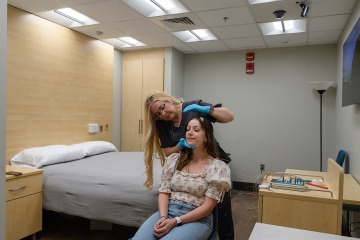New sleep center wins design and construction award
The new University of Arizona Health Sciences Center for Sleep, Circadian and Neuroscience Research has been awarded an Engineering News-Record 2023 Southwest Small Project Award of Merit in the publication’s annual Best Projects Competition. The publication has recognized the best in design and construction in the Southwest for more than 25 years.

Sicily La Rue, lead sleep technologist at the Center for Sleep, Circadian and Neuroscience Research, applies polysomnographic electrodes, used for measuring sleep, to SCAN Lab technician Camryn Wellman in one of the sleep rooms.
The center’s new facility, which opened in May, was funded by a $5 million construction grant from the National Institutes of Health Office of the Director. It’s 12,700 square feet of highly controlled environment allows for state-of-the-art research looking at the connections between sleep-circadian disorders and other conditions such as cancer, pain, cardiovascular disease, cognition, mental health and long COVID.
“This award underscores the innovation in design and quality that enables the performance of high-caliber, cutting-edge research at the University of Arizona Health Sciences Center for Sleep, Circadian and Neuroscience Research Center,” said Sairam Parthasarathy, MD, chief of the Division of Pulmonary, Allergy, Critical Care and Sleep Medicine at the University of Arizona College of Medicine – Tucson. “The center is one of a kind and is capable of manipulating lighting intensity, timing and inhaled gases, while enabling blood collection and the administration of medications remotely without disturbing the sleeping participant.”
The new eight-bedroom facility, located in the lower level of a former Banner – University Medical Center Tucson building, allows for continuous monitoring of the environment in each room using sensors for light, noise, room, core body and skin temperatures, and inhaled gases, all of which are collected and recorded with date and time stamps in a synchronous manner with the sleep and circadian rhythms in computerized software. The rooms also allow for remote blood sampling or the administration of medications through IV tubing leading to a control room, meaning researchers won’t disturb the test subject while collecting samples.
“The University of Arizona Health Sciences has studied sleep for more than four decades, and our researchers have made pioneering advances in understanding the connections between sleep and cardiovascular disease, neurocognition and behavioral interventions,” said Michael D. Dake, MD, senior vice president for UArizona Health Sciences and principal investigator on the grant. “The new center is helping us find new solutions to critical sleep issues, improving health and human potential for all.”
The ENR Southwest’s annual Best Projects competition includes entries from Arizona, Nevada and New Mexico. A panel of industry judges reviewed around 80 entries, considering factors such as safety, innovation, craft quality and community or industry benefit.

